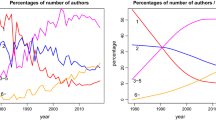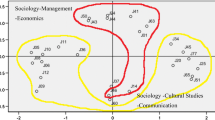Abstract
A detailed quantitative, citation study is made on the concepts of Bell, Machlup, and Drucker related to the economic and social effects of the growth of information-based industries.
Similar content being viewed by others
References
P. L. K. Gross, E. M. Gross, College libraries and chemical education,Science, 66 (1927) 385–389.
H. Cason, M. Lubotsky, The influence and dependence of psychological journals on each other,Psychological Bulletin, 33 (1936) 95–103.
H. Small, Cocitation in the scientific literature: A new measure of the relationship between two documents,Journal of the American Society for Information Science, 24 (4) (1973) 265.
S. E. Cozzens, What do citations count? The rhetoric-first model,Scientometrics, 15 (1989) 437–447.
M. J. Moravcsik, P. Murugesan, Some results on the function and quality of citations,Social Studies of Science, 5 (1975) 86–92.
D. A. Dillman, Information society, In:International Encyclopedia of Social Science, p. 925.
K. Kumar, Industrialism and post-industrialism: reflections on a putative transition,Sociological Review, 24 (3) (1976) 442.
W. Paisley, The convergence of communication and information science, In:Libraries and Information Science in the Electronic Age,H. Edelman (Ed.), Philadelphia: ISI Press, 1986, p. 127.
S. Cole, The growth of scientific knowledge: theories of deviance as a case study, In:The Idea of Social Structure: Papers in Honor of Robert K. Merton,L. A. Coser (Ed.), New York: Harcourt Brace Jovanovich, 1975, p. 187.
A. Garfield, Uncitedness IV — The importance of not being cited,Current Contents, 8 (Feb. 21, 1973) 5–6.
Comment from D. W.Krummel.
N. Birnbaum, Review of Bell,New York Times Book Review, July 1, 1973, p. 1.
N. Bliven, Who gets what?New Yorker, 49 (Sep. 17, 1973) 151.
J. Featherstone, A failure of political imagination,New Republic, 169 (Sep. 15, 1973) 24.
R. J. Jordan, Review of Machlup,Special Libraries, 54 (1963) 535.
E. T. Chase, Review of Drucker,New Republic, 160 (June 21, 1969) 26.
M. Gustafson, Criticism: Books and the arts, new dialectic,Christian Century, 86 (April 16, 1969) 519.
Paisley, p. 142.
K. B. Levitan, Information resources as ‘goods’ in the life cycle of information production,Journal of the American Society for Information Science, 33 (1) (1982) 44.
C. M. Stewart, L. Usenko, Videotex: Addressing the information needs of the corporate end user,Proceedings of the American Society for Information Science, 22 (1985) 73.
C. K. Mick, G. N. Lindsey, D. Callahan, Toward usable user studies,Journal of the American Society for Information Science, 31 (5) (1980) 347.
R. D. Johnson, Machlup and the information age,Scholarly Publishing, 18 (4) (1987) 271.
H. C. Relyea, Discussion forum: A new discipline,Government Information Quarterly, 3 (1) (1986) 2.
H. Reynolds, Bibliographic guide to issues of national and international government information policies,Government Publications Review, 11 (1) (1984) 31.
S. Crawford, The origin and development of a concept: The information society,Bulletin of the Medical Library Association, 71 (4) (1983) 380–385.
B. Cronin, Disjointed incrementalism and 1990,Aslib Proceedings, 37 (11–1) (1985) 422.
S. Artandi, Man, information, and society: New patterns of interaction,Journal of the American Society for Information Science, 30 (1) (1979) 18.
E. G. Parker, Information and society,Annual Review of Information Science and Technology, 8 (1973) 348.
W. F. Birdsall, Librarianship, professionalism, and social change,Library Journal, 107 (3) (1982) 224
P. J. Hart, R. Rice, Using information from external database: Contextual relationships...,Information Processing and Management, 27 (5) (1991) 461.
B. Cronin, Adaptation, extinction or genetic drift?Aslib Proceedings, 35 (6–7) (1983) 278–279.
C. Ganz, The role of scientific communication in the process of technological innovation,Aslib Proceedings, 28 (11–1) (1976) 385.
C. Steinfield, G. Pizante, M. Komiya, Using telecommunications for competitive advantage: a case study analysis of management strategies.Information Age, 12 (1) (1990) 33.
S. Reese, Information work and workers: technology attitudes, adaptation and media use inTexas, Information Age, 12 (3) (1990) 160.
F. L. Miksa, Machlup's categories of knowledge as a framework for viewing library and information science history,Journal of Library History Philosophy and Comparative Librarianship, 20 (2) (1985) 162.
A. E. Cawkell, The real information society: present situation and some forecasts,Journal of Information Science 12 (3) (1986) 87.
M. D. Cooper, The structure and future of the information economy,Information Processing and Management, 19 (1) (1983) 12.
B. Cronin, Toward information-based economies,Journal of Information Science, 12 (3) (1986) 130.
C. Nass, Following the money trail: 25 years of measuring the information economy,Communication Research, 14 (60) (1987) 698, 704.
S. D. Reese, New communication technology and the information worker: The influence of occupation,Journal of Communication, 38 (2) (1988) 59–60.
R. L. Stevenson, The politics of information,Communication Research, 8 (4) (1981) 503.
M. U. Porat, Global implications of the information society,Journal of Communication, 28 (1) (1978) 70–80.
E. B. Parker, Implications of new information technology,Public Opinion Quarterly, 37 (4) (1973) 598.
R. Newman, J. Newman, Information work: the new divorce?The British Journal of Sociology, 36 (4) (1985) 497–498.
S. Encel, The post-industrial society and the corporate state,Australian and New Zealand Journal of Sociology, 15 (2) (1979) 39–40.
P. L. Berger, Ethics and the present class struggle,Worldview, 21 (4) (1978) 6.
W. Gouldner, The new class project, I,Theory and Society, 6 (2) (1978) 153, 158.
J. D. Hunter, The perils of idealism: A reply,Review of Religious Research, 24 (3) (1983) 268.
J. Zubrzycki, The challenge of change,Australian and New Zealand Journal of Sociology, 15 (3) (1979) 86.
T. Lehmann, Conflict theory to conflict methodology-emerging paradigm for sociology,Sociological Inquiry, 44 (1) (1974) 19.
W. R. King, Information technology and corporate growth,Columbia Journal of World Business, 20 (2) (1985) 29.
A. W. Smith, A five stage model of management evolution,Human Systems Management, 1 (3) (1980) 217.
G. P. Huber, The nature and design of post-industrial organizations,Management Science, 30 (8) (1984) 929–930.
S. C. Jain, S. S. Singhvi, Environmental forecasting and non-profit professional organizations,Long Range Planning, 10 (3) (1977) 50–58.
C. Holloway, Does futures research have a corporate role?Long Range Planning, 11 (5) (1978) 17–24.
W. E. Halal, Business and government — a new partnership?Long Range Planning, 20 (1) (1987) 123–130.
P. K. Mills et al., Flexiform: A model for profesional service organizations,Academy of Management Review, 8 (1) (1983) 118–119.
P. K. Mills, D. J. Moberg, Perspectives on the technology of service operations,Academy of Management Review, 7 (3) (1982) 467.
P. K. Mills, N. Margulies, Toward a core typology of service organizations,Academy of Management Review, 5 (2) (1980) 260.
D. E. McFarland, Management, humanism, and society: the case of macromanagement theory,Academy of Management Review, 2 (4) (1977) 620.
W. E. Halal, B. S. Brown, Participative management: myth and reality,California Management Review, 23 (4) (1981) 20.
J. Voge, Information and information technologies in growth and the economic crisis,Technological Forecasting and Social Change, 14 (1) (1979) 1.
P. Glazer, Marketing in an information-intensive environment,Journal of Marketing, 55 (4) (1991) 2–3.
Author information
Authors and Affiliations
Rights and permissions
About this article
Cite this article
Tsay, MY. The impact of the concept of post-industrial society and information society: A citation analysis study. Scientometrics 33, 329–350 (1995). https://doi.org/10.1007/BF02017335
Received:
Issue Date:
DOI: https://doi.org/10.1007/BF02017335




